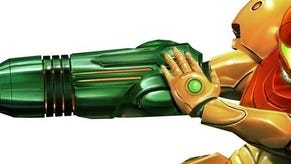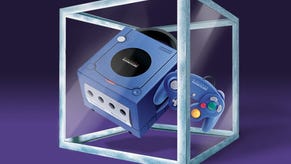Metroid Prime 2: Echoes
Every year an utterly essential game appears that no-one buys. Buck the trend.
Shame on you for passing up on the opportunity to play one of the games of the year. In with a bullet at No.33 in the UK charts, gone the next week. When such anomalies occur you feel like packing it all in and strapping a megaphone on your face and annoying Christmas shoppers in a Scouse accent with talk of football and Jesus. Remember: don't be a sinner, be a winner! Buy this game and set yourself free.
Samus, or should we say shame us, for taking so long to review this game. There have been less concerted campaigns to free wrongly accused terrorists and less angry fathers denied access rights, but some things in life it would be irresponsible to rush. Metroid Prime 2: Echoes is one of those games that you couldn't hurry if you wanted to; you'd only come a cropper in the end. The whole game world is too intricately designed and elaborately constructed into a coherent environment that the only option available to you is to soak up everything you see, learn your way around, read everything, make endless mental notes about the areas inaccessible to you, and remove any expectations and bad habits you may have from the countless other games that make things easier, less frustrating but far less exciting and involving in the long run.
Buy. This. Game. Now.
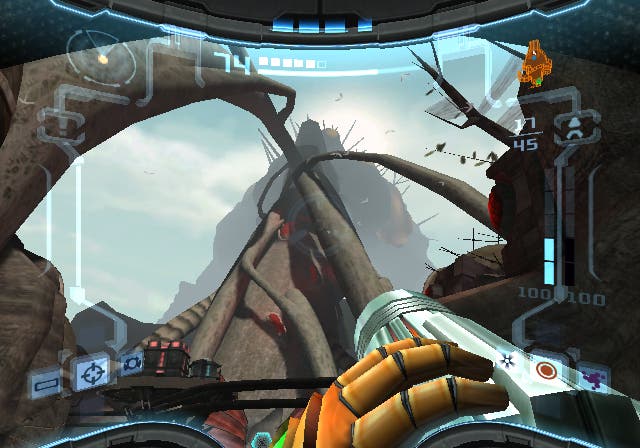
If you've played any of the previous Metroid games then this will be old news. The chances are you'll have rushed out and bought Echoes already - probably on the strength of the fantastic GameCube predecessor, in which case you'll be as exasperated as we are that this has been trampled in the Christmas rush. Few games have warranted such evangelical praise yet fallen on so many deaf ears. The failure of Echoes to perform commercially will blacken the hearts of many gamers for years to come, and for good reason.
But in a way, its current failure isn't all that unexpected. Reducing Echoes to its basic form, it wouldn't be unreasonable to surmise from a quick glance that it's more of the same with multiplayer tacked onto it. Roughly the same visual sheen, identical controls, a similar array of power-ups and weapons, and the whole "scan everything" gameplay mechanic, enemies that respawn from previously cleared areas, hard as nails boss encounters. You know the drill. On a very superficial level it definitely is a case of more of the same, but the more time you spend with Echoes, glib statements such as these get under your skin. Retro Studios didn't need to reinvent the wheel, when that wheel is so unlike anyone else's in the first place. After playing literally dozens of formulaic first-person shooters over recent years, the craft and invention of Retro's worlds scream out at you.
But we're probably preaching to the choir here anyway. Metroid Prime 2 is probably best summed up as Heaven and Hell - in more ways than you'd imagine. Set on the planet Aether, a noble race of insectoid-like beings called the Luminoth have had their peaceful way of life torn asunder after a meteor falls from the sky and rips a dimensional rift, causing a dark version of their planet to exist in another dimension. A violent race of creatures known as the Ing spawn as a result - think of them as the 'dark side' of the Luminoth - and begin stealing the light energy as a part of trying to conquer the light version of Aether as well.
Sell your Grandmother!
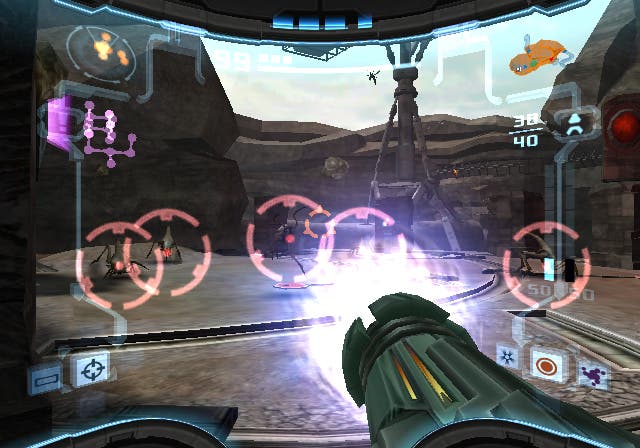
This internal conflict would have probably reached its own bloody conclusion were it not for the fact that a Galactic Federation ship chased a Space Pirate vessel onto Aether, only to be wiped out themselves by the Ing hordes; which is the rather convoluted reason that Samus Aran ends up investigating their disappearance.
Exploring the wreckage, and encountering U-Mos, the Luminoth guardian of the one small part of Light Aether that has survived the onslaught. a sense of purpose emerges, but it does initially feel like more of the same. The first few hours do little to convince that much has really changed; it's all scan and plan, checking the map to make sure you've explored every door, wrestling power-ups off gigantic boss creatures while trying to get to grips with its doggedly unique control system and fighting enemies that respawn every bloomin' time you revisit a previously cleared section. It still rankles slightly that Retro has dispensed with the dual analogue stick industry standard approach of every other console FPS ever, forcing the player into slightly unwieldy processes such as having to hold the right shoulder button in order to free-look, yet making up for it with a flawless camera system and slick lock-on system that makes circle strafing an absolute breeze. It's not perfect, but then neither is the alternative. It's just one of many examples of Retro doing things very differently to practically everybody else, and something you'll probably end up admiring them for.
After a somewhat uninspiring beginning that has little of the dramatic tension that infused the early encounters of the last outing, you're left wondering whether Retro has simply churned out a quick and easy sequel. No-one would blame anyone for coming to such conclusions early on, but as soon as the game spins on its head and introduces you to Dark Aether you have to think about the game on a totally different level. It's basically twice the game because of it.
Rob banks!
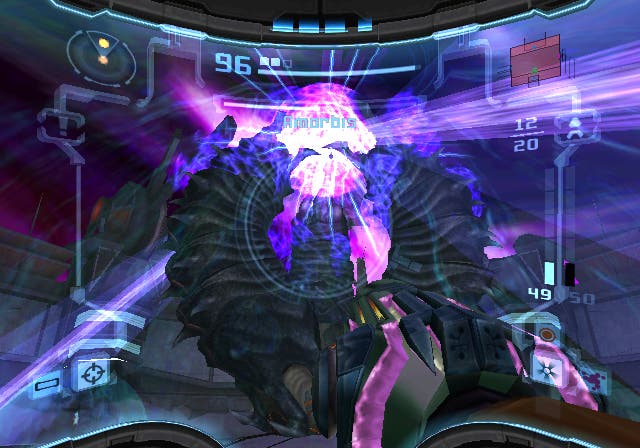
As if Metroid Prime's open-ended level structure didn't cause enough chaos, with vast areas of the world available to traverse (and get hopelessly lost in), Echoes ups the ante even more by presenting the player with problems in Light Aether that can only be solved by activating portals and jumping into the dark side, meddling with objects in that dimension, hopping back and forth and generally feeling your way through two sides of the same coin. It's possibly one of the most mind-frying gaming experiences we've ever come across - but also one of the most satisfyingly challenging of all time as a consequence.
Unlike the procession of hold-you-by-the-hand shooters out there, Echoes' approach, as with MP, is quite the reverse. Often you have little direction on what to do or where to go. It's simply left up to you to explore what's available to you, figuring things out largely on your own (with only the occasional hint dropped if the game thinks you're taking a long time over getting somewhere). In a very real sense, this is both the triumph of Echoes and probably the most daunting facet of its structure. There's something incredibly involving about chipping your way through the game, scanning everything, reading the dozens of logs left by downed Luminoth warriors, as well as finding out the inside story on every plant species and enemy you encounter. Some might find the whole 'gotta catch 'em all' scanning element a bit tedious, and initially it is, but as the story begins to envelope you, and the recognition factor starts to seep in through repeat visits, the desire to progress gets ever stronger.
Echoes is unique in being one of those game where using a guide will probably make the whole experience more enjoyable. There are simply too many occasions where messing up or - at best - wasting time will chip away at your resolve. The somewhat unhelpful save mechanic (which involves having to find a save point, rather than giving you the ability to save when you like, or checkpointing progress) can get you into all sorts of headaches. Stumble into a room full of tough enemies ill-equipped is a recipe for disaster, especially when it's been ages since you last saved. Joypads have been hurled in utter fury on numerous occasions as a result of this, and in this day and age there's really no need to enforce such tough, old school approaches onto gamers - especially in a game as demanding as this.
Buy a GameCube!
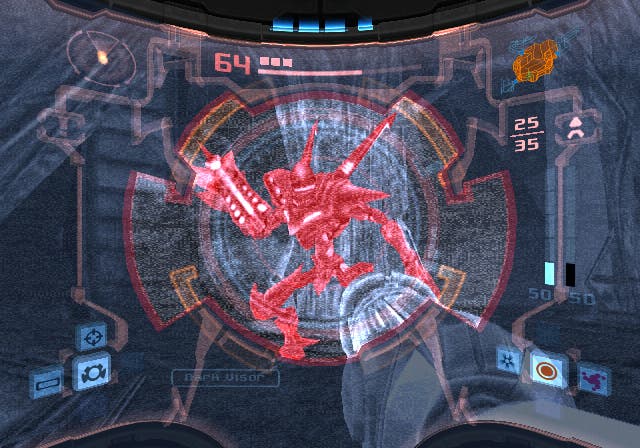
The chances are getting stuck or lost will prove even more frustrating, with enemies doggedly respawning out of rooms that you've revisited maybe a dozen times already. We realise part of the game's appeal is constructing a coherent world that all stitches together, and that they'd appear very empty if you only ever killed each room's enemies once. But at the same time, forcing you to waste ammo and health (not to mention time) on battles you've fought many times over isn't a great deal of fun. This is why this writer would actually recommend playing the game with a guide - it doesn't lessen the surprise, and prevents the omnipresent possibility of going dramatically off course. Not only that, Echoes hides energy and ammo upgrades so cunningly sometimes that you're going to need all the help you can get - especially in the numerous boss encounters; some of which held us up for literally hours at a time. One in particular midway through the game requires the equivalent of five defeats in various forms before it finally croaks, and under these circumstances you'll realise why certain people always bang on about other games being 'easy'. Next to Echoes they almost certainly are.
But what Echoes does better than possibly any game on this nature is constantly providing something new to experience, either in the form of new abilities, weapons, environments, creatures, or even the almost overwhelming procession of evil bosses. There's never a stage in Echoes where you feel you've seen all it has to offer, and if anything there's too much. If anything the game's too long and most of its audience won't have the time to see all that it has to offer, but the rewards are there for those that choose to indulge themselves.
To begin with the Samus finds herself quickly stripped of anything useful, only getting back the Morph ball from an early boss encounter to add to her entirely rubbish pop gun. Slowly but surely new abilities rack up. Power, Dark and Light Beams make killing the regular drones less painful (as well as making it possible to open doors), while Missiles in their regular, Super and Seeker form do much the same, albeit in a more concentrated form. Other abilities, meanwhile, are more useful in accessing hard to reach places, with the returning Bomb, Boost and Spider helping you charge the Morph ball into places otherwise out of range (as well as doubling up in some cases as an attack device), while the likes of the Space Jump boots, Grapple Beam and Gravity Boost all return to make it easier for Samus to negotiate the landscape, and the somewhat spectacular Screw Attack not only allows her to perform huge horizontal and somersaulting wall jumps, but mash up the enemy as well. And as if that wasn't bewildering enough, the new Dark and Echo visors allow Samus' enhanced senses to visualise inter-dimensional objects and sound waves. The sheer level of imagination that has gone into Echoes is mind boggling, while keeping faith with everything that made the previous games in the series so well admired.
Do not under any circumstances fail to play this game
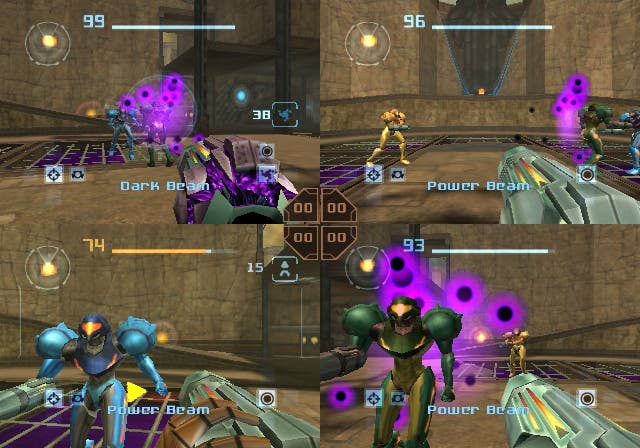
But not only do the new abilities add a much needed sense of novelty to the proceedings, they often change the way you approach the numerous puzzles. The game won't hold your hand for you. It's very much a process of elimination, although always logical and never as obscure as you might initially think. Echoes' biggest problem is that so few games actually require you to think anymore. As a largely non-thinking gamer ingrained with so many lazy habits over the past five or so years, being forced to actually not only figure things out, but explore, retain key information and be bloody good at defeating rock hard bosses makes Echoes one of the true gamers' games to have emerged in the past couple of years - probably the first since the original Metroid Prime to be fair. When they say they don't make 'em like they used to, point them in the direction of Echoes, and realise that they do; they're just not in the Top 10 for some staggeringly irritating reason.
But we're not done yet. Unlike last time out, there's multiplayer to consider, although only split-screen for up to four players, only with half a dozen maps and only two modes. It is, to be blunt, and bit tacked on for sake of it, and not really conducive to more than a cursory glance. With a small number of players to accommodate, and controls that aren't suited to multi-level combat the levels are largely flat symmetrical affairs that make it easy to track down opponents - made even easier by the presence of radar. To be brutal, the single-player mechanics were never meant to be translated into multiplayer, so the ability to turn into a Morph ball and run away makes encounters slightly irritating, while the ability to lock onto opponents and pound them with too-powerful weapons makes a fair fight a distant prospect.
Add to those daft power-ups like Invincibility, or the Super Missile or Heavy Damage, Unlimited Ammo and it's one of those games you quickly tire of. Combat is reduced to circle strafe fests, or a ball chasing farce, and that's before you've even delved into the utterly pointless Bounty mode, which adds coin collections into the mix, yet descends into a last kill wins farce, whereby someone who has dominated the entire match can lose if he or she should happen to be killed just before the time limit expires, allowing the victor to scoop up all their hard won winnings. Arse. It's also slightly disappointing to see that all the hard won weapons from the single-player are available from the off, lessening the surprise of discovering them in the first place. Our advice is if you want to get the most out of single-player, lay off multiplayer until you're all done.
Buyitbuyitbuyit
And with that, the verdict. Don't let the muted disappointment of the multiplayer discolour what is among the best single-player experiences we've ever experienced. Certainly up there with literally anything else, including Half-Life 2, San Andreas, and as far as enjoyment, intrigue, reward and challenge, far surpasses the likes of Halo 2 and Killzone, and shows up the competition in more ways than we could care to mention. It'll last you ages, it'll test you to the limit and at times make you furious with your own lack of skills and the game's lack of forgiveness. But when what you're fighting for is possibly the complete sci-fi adventure you won't mind, even when it means fighting the same boss 20 times over two hours. It's the kind of game you have absolutely no qualms being obsessed by. It's the game that compulsive disorder was designed for.
>

